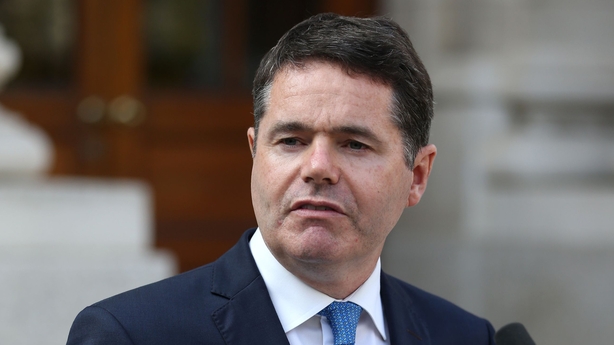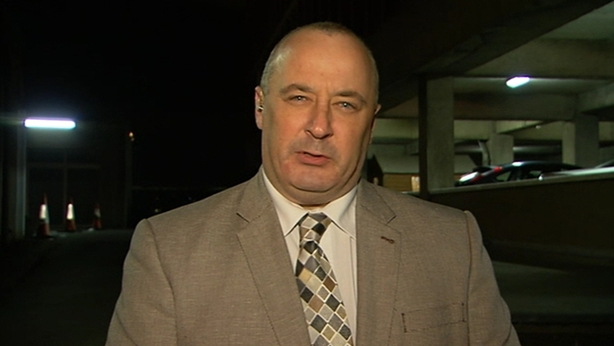Minister for Public Expenditure and Reform Paschal Donohoe has said he has full confidence in the chairperson of the Public Services Pay Commission (PSPC) Kevin Duffy.
The Association of Garda Sergeants and Inspectors (AGSI) and the Garda Representative Association (GRA) have both criticised Mr Duffy for his comments today about the recent garda strike threat.
At an industrial relations conference, Mr Duffy described the threatened strike as tantamount to "mutiny" and illegal by any standard.
The AGSI described the comments as damaging and divisive.
The president of the GRA said Mr Duffy's position was "becoming untenable".
This evening, Mr Duffy told RTÉ News that he respected the gardaí, but stood by his comments that what their associations proposed to do was unlawful.

In a statement this evening, Minister Donohoe said: "The PSPC, which has been established to examine a pathway towards the unwinding of FEMPI measures, is independent of Government, as is its members.
"Its function is to inform negotiations, which will ultimately be carried out between public service employers directly with unions and associations.
"Mr Duffy's record, expertise and experience, as a former chair of the Labour Court, speaks for itself. He is the right person to carry out such work."
Speaking on RTÉ's Six One News, GRA president Ciarán O'Neill said his association no longer has confidence in Mr Duffy as chairman of the PSPC, questioning his independence, integrity and his impartiality.
Mr O'Neill said Mr Duffy needs to retract his comments and reflect on his position as chairman of the PSPC.

AGSI President Antoinette Cunningham also called on Mr Duffy to retract his remarks.
The AGSI national executive was shocked, she said, that a Government-appointed, and supposedly independent, chairman would articulate such views.
She described Mr Duffy's comments as unfair, unfounded and hugely damaging to relations between the association and the PSPC.
Ms Cunningham said the AGSI "had it on good legal standing" that actions taken by members during their industrial relations activities were in no way illegal.
The law, she said, was not "prescriptive" in this matter and she noted that in 2014 the AGSI had won an EU decision which effectively recognised its members' right to strike.
She cited the comments of Minister Donohoe when he appointed Mr Duffy as chair of the PSPC when he outlined a requirement for qualities including a thorough knowledge of industrial relations, independence and objectivity.
AGSI members, she noted, are currently balloting on a Labour Court proposal negotiated some weeks ago in what she called a fair and conciliatory manner and under due process - but under very stressful conditions.
Mr Duffy had told the conference that everyone knew it was imperative that the garda dispute be settled, but there appeared to be no appetite to deal with what was in effect an act of illegality on the part of the people whose job it is to uphold the law.
He said that in relation to the garda strike, there was either no mechanism to enforce the law or no desire to enforce the law, and that sort of thing brings the law into disrepute.
He warned that if the Government were to amend the law to make it more difficult for workers to strike, it would have to be enforced.
He acknowledged there had been "mutterings" about whether the Labour Court had gone too far in the recommendation aimed at averting strike action by gardaí.
However, he said that in dealing with the dispute, the Labour Court had found itself in circumstances where there was an imperative to resolve the dispute, and that was what the court had done.
At the conference, employment law specialist Seamus Given of Arthur Cox solicitors agreed with Mr Duffy that the garda strike was outside the law.
He said he was horrified that people supposed to enforce the law were breaking it and holding the populace to ransom.
Mr Given described some of the laws on strikes and picketing as completely "bonkers".
This evening, Mr Duffy said his comments were made to demonstrate that enacting legislation to prohibit strikes does not prevent them.
Speaking on RTÉ's Drivetime, Mr Duffy said the point he was making was that the law is only valuable if it can be enforced.
Mr Duffy said his comments were not an attack on gardaí, and that he was simply making the point that what they proposed to do was unlawful.
"I have no desire to mount an attack on the gardaí; I have the height of respect for the guards. I was simply illustrating a point that enacting legislation that prohibits strikes, doesn't stop strikes. That's the point I was making."
He defended his use of the words "mutiny", and "unlawful", saying he does not accept that the proposed industrial action was lawful.
Mr Duffy said he does not know if the Lansdowne Road Agreement will survive as it is currently structured, adding that that is a matter for the parties involved.
We need your consent to load this rte-player contentWe use rte-player to manage extra content that can set cookies on your device and collect data about your activity. Please review their details and accept them to load the content.Manage Preferences

